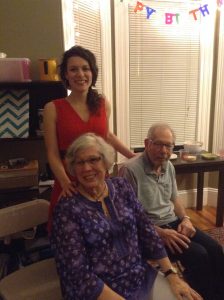 Ira died last night. He was the husband of Laurie Sheridan, who was featured in Episode One of The Shape of Care. Ira had been living with Parkinson’s Disease for sixteen years and was on the brink of death several times. Last Christmas, Laurie thought it was all over. Ira spent a week in the hospital, but somehow, he pulled through. This time, he got pneumonia – for the fifth time – and that was it. And despite all of these “previews”, the finality of his death is something else.
Ira died last night. He was the husband of Laurie Sheridan, who was featured in Episode One of The Shape of Care. Ira had been living with Parkinson’s Disease for sixteen years and was on the brink of death several times. Last Christmas, Laurie thought it was all over. Ira spent a week in the hospital, but somehow, he pulled through. This time, he got pneumonia – for the fifth time – and that was it. And despite all of these “previews”, the finality of his death is something else.
Through Laurie, I learned what it’s like to lose a partner in daily increments, first as his sole caregiver, and eventually, with his decline, sharing that work of caring for Ira with a cohort of amazing care workers whom she hired. If you’ve listened to the episode that features Laurie, you know she speaks eloquently about this experience, as she worked to adjust to this “new normal” in her life. Parkinson’s Disease is a degenerative disease. It chipped away at Ira’s body and eventually his mind. When he was no longer able to leave the house, Laurie brought her outside life inside. Like when her book club came over to the house, and Ira would sit silently in his recliner in a corner of the room. Sometimes, he would surprise everyone by saying something that was entirely relevant to the conversation. That’s when everyone knew his mind was still active. Ira’s health was profoundly compromised, but he had moments of light, even when he was close to death. And now he’s really gone. When I spoke with Laurie this morning, this is what I heard – how surreal it is that he’s here no longer…
I know Laurie has touched so many people with her honesty and authenticity in talking about her experience caring for Ira. I know because people have told me how moved they were by her story. And I know, in this really weird way, because I have the statistics to show me that hundreds of people have listened to her episode.
When I first heard Ira died, I cried…for the hell Laurie has been through and the sadness she has experienced. For the beauty of her resilience. For her kids, who have lost their dad. Because it touched an amorphous universal sense of loss and finiteness that we can all tap into. Because I have come to know Laurie and the complexity of emotions she’s been wading through. And because we will all face decline and eventually, death.
I know that Laurie will be back in Season 2 of The Shape of Care, reflecting on her experience. She has also kindly expressed thanks to me for being a part of this project. Caregiving issues are now a passion for her. She has experienced them firsthand. And as someone who is also knowledgeable about social policy related to care issues, she says that this will be her work moving forward.
When I first interviewed Laurie, I didn’t know that this friendship between us would develop. I’m grateful to be a small part of her story.